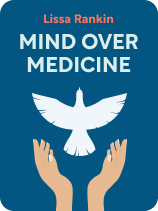

This article is an excerpt from the Shortform book guide to "Mind Over Medicine" by Lissa Rankin. Shortform has the world's best summaries and analyses of books you should be reading.
Like this article? Sign up for a free trial here.
Why are we so stressed as a society? How does chronic stress affect mental health?
As a result of the fast pace of modern life, we endure a lot of ongoing, chronic stress. According to physician Lissa Rankin, the author of Mind Over Medicine, chronic stress stands behind the modern mental health epidemic of anxiety and depression.
Here’s how chronic stress drives the mental health epidemic plaguing societies today.
Anxiety and Depression Are an Epidemic
To understand the overlooked effects of stress on mental health, let’s explore the epidemic of anxiety and depression in the US. Lifestyle factors like loneliness and job stress contribute to these conditions, which leads to chronic stress and prevents us from healing.
Anxiety is a state of anticipatory fear. Rankin says that about 40 million Americans and 400 million people worldwide suffer from anxiety disorders. She explains that chronic anxiety causes your amygdala to become increasingly sensitive to whatever triggers your fear. Your amygdala is responsible for storing subconscious “fear memories,” so as it becomes extremely sensitive to certain triggers, you begin to feel constant anxiety without consciously knowing why. Hypersensitivity to your surroundings leads to more of the stress responses we discussed in the previous section, which can make our bodies vulnerable to disease, so Rankin says it comes as no surprise that anxiety is associated with health issues such as weak immune systems, heart disease, and cancer.
(Shortform note: Experiencing anxiety without a known cause can lead you to feel more anxiety about your symptoms (for example, uncontrollable shaking) because you might not understand what’s happening to your body. When you view the physical symptoms of your own anxiety as a threat, this can lead to a spiral of extreme panic, otherwise known as a panic attack. Although this isn’t considered dangerous, it’s very uncomfortable and can prevent you from performing aspects of your daily routine or attending important events that you think might cause a panic attack. Aside from medication, one treatment for panic disorder is cognitive behavioral therapy, which can help you adjust your threat response appropriately for non-threatening triggers.)
Another mental health disorder that plagues the modern age is depression. Depression is a condition of chronic negative emotion. Rankin says each year, this condition affects 21 million Americans and 300 million people worldwide. In the United States, depression is the number one cause of disability for people ages 15 to 44 and is responsible for 30,000 suicides annually. Similar to anxiety, depression progresses in a feedback loop. When you experience chronic negative emotions, you repetitively trigger stress responses that deplete your energy and feel-good hormones like dopamine and serotonin. Rankin says this creates a downward spiral of continuous negative emotion and stress.
(Shortform note: What’s the difference between depression and sadness? Sadness is a temporary negative emotion you might experience in reaction to a specific trigger—like when a loved one dies or you don’t land the job you’re excited about. This feeling typically lasts no longer than a couple of days. Depression, on the other hand, is a chronic state of negative emotion that pervades all aspects of your life. Depression doesn’t just make you feel sad, it can make you feel disconnected and numb to activities and people you once cared about. Unlike regular sadness, depression often doesn’t have a specific cause.)

———End of Preview———
Like what you just read? Read the rest of the world's best book summary and analysis of Lissa Rankin's "Mind Over Medicine" at Shortform.
Here's what you'll find in our full Mind Over Medicine summary:
- How a healthy mind can heal physical ailments
- How our beliefs, our relationships, and our jobs affect our health
- How to improve the most important parts of your life






